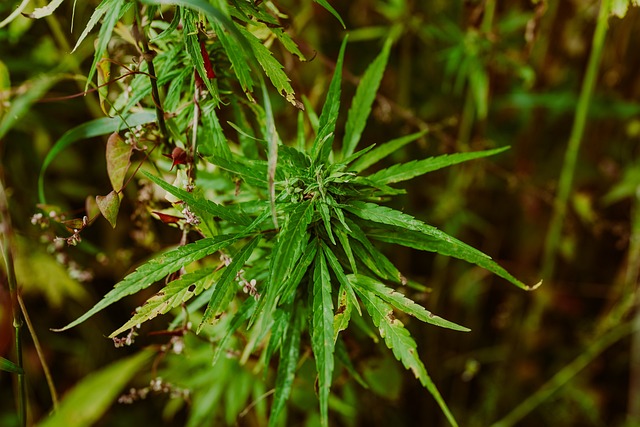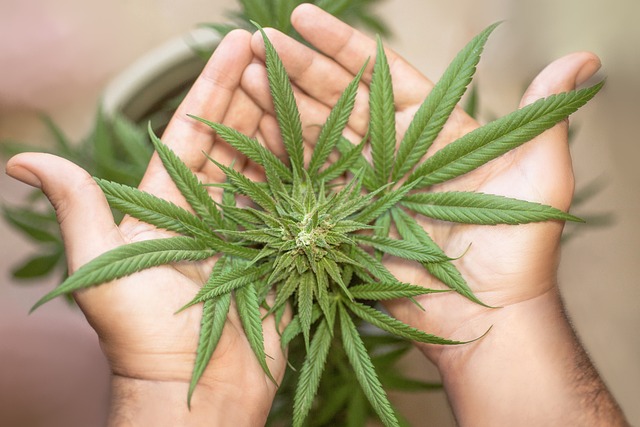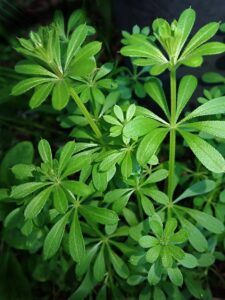
The THCA flower, rich in the non-psychoactive cannabinoid THCA, has emerged as a potential therapeutic agent due to its anti-inflammatory properties. Unlike its psychoactive counterpart, THC, THCA does not cause mind-altering effects and has been found to inhibit pro-inflammatory cytokines and enzymes such as COX-2, which are key to prostaglandin production and associated with inflammation and pain. Its interaction with CB1 and CB2 receptors within the endocannabinoid system helps regulate immune responses, offering a safe and effective alternative for managing inflammatory conditions without psychoactive side effects. The THCA flower's anti-inflammatory capabilities extend to its neuroprotective effects, safeguarding against glutamate excitotoxicity, a mechanism linked to inflammation and cell death. As an emerging natural anti-inflammatory agent, the THCA flower holds promise for those seeking therapeutic benefits in the realm of health and wellness without psychotropic influence, making it an intriguing option for complementary and alternative medicine. Consumers are advised to use high-quality THCA flower and consult healthcare professionals, considering various consumption methods like smoking, vaporizing, or infusing into edibles, to optimize its anti-inflammatory effects.
Explore the transformative potential of THCA flower, a botanical compound with promising anti-inflammatory effects. This article delves into the intricacies of how THCA flower interacts within our bodies to offer these health benefits. From its scientific foundations to practical usage, uncover the multifaceted advantages of incorporating THCA flower into your wellness routine. Join us as we shed light on the natural anti-inflammatory properties of this emerging wellness ingredient.
- Unlocking the Potential of THCA Flower: A Deep Dive into Its Anti-Inflammatory Properties
- The Science Behind THCA Flower's Anti-Inflammatory Effects
- Utilizing THCA Flower for Anti-Inflammatory Benefits: Methods and Considerations
Unlocking the Potential of THCA Flower: A Deep Dive into Its Anti-Inflammatory Properties

Delta-9-tetrahydrocannabinolic acid (THCA) is the non-psychoactive precursor to the well-known compound THC found in the cannabis plant. The THCA flower, rich in this cannabinoid, has garnered attention for its potential therapeutic benefits, particularly its anti-inflammatory effects. Studies indicate that THCA interacts with the body’s endocannabinoid system, influencing immune responses and exhibiting properties that could be beneficial in managing inflammation. This natural compound may offer a safe alternative for those seeking relief from conditions characterized by inflammatory responses without the psychoactive effects associated with its decarboxylated form, THC.
The anti-inflammatory properties of THCA are thought to stem from its ability to inhibit certain pro-inflammatory cytokines and enzymes. In preclinical models, THCA has been observed to modulate the activity of COX-2, an enzyme involved in the production of prostaglandins that play a role in inflammation and pain. Additionally, THCA’s interaction with the CB1 and CB2 receptors may contribute to its anti-inflammatory profile by regulating the immune system’s overactive response. As research continues to unfold, the potential for THCA flower to become a valuable addition to complementary and alternative medicine for inflammation-related conditions becomes increasingly evident.
The Science Behind THCA Flower's Anti-Inflammatory Effects

Delta-9-tetrahydrocannabinolic acid (THCA) is a non-psychoactive cannabinoid found abundantly in raw cannabis flowers, which has garnered attention for its potential anti-inflammatory effects. Research indicates that THCA interacts with the body’s endocannabinoid system through its receptors, particularly CB1 and CB2. This interaction is believed to modulate immune responses, thereby exerting a natural anti-inflammatory action. Studies have shown that THCA can inhibit certain pro-inflammatory cytokines and enzymes involved in the inflammatory response, such as COX-2, without inducing psychoactive effects like those associated with its decarboxylated form, THC. The anti-inflammatory properties of THCA are also supported by its ability to reduce nitric oxide production in immune cells, a molecule that plays a key role in the inflammatory process. This makes THCA flower a subject of interest for therapeutic applications aimed at managing conditions characterized by excessive inflammation, without the mind-altering side effects often associated with cannabis.
Furthermore, the anti-inflammatory capabilities of THCA are not limited to its direct interaction with immune cells; it also exhibits neuroprotective properties that may contribute to its anti-inflammatory profile. THCA has been observed to protect against glutamate excitotoxicity, a condition characterized by excessive stimulation of nerve cells by the neurotransmitter glutamate, which can lead to inflammation and cell death. This dual action on both immune and nervous system pathways highlights the potential for THCA flower as a natural anti-inflammatory agent with broad applications in health and wellness.
Utilizing THCA Flower for Anti-Inflammatory Benefits: Methods and Considerations

THCA, or tetrahydrocannabinolic acid, is a non-psychoactive cannabinoid found abundantly in raw cannabis plants, including the much-discussed THCA flower. This cannabinoid precursor to the well-known psychoactive compound THC has been gaining attention for its potential anti-inflammatory effects. Consuming THCA flower for these benefits involves either consuming it raw or through decarboxylation processes that convert THCA into THC. When using THCA flower for its anti-inflammatory properties, it’s important to consider the dosage and method of administration. For instance, THCA flower can be smoked, vaporized, or infused into edibles; each method affects bioavailability differently. Users interested in leveraging the anti-inflammatory effects of THCA flower should start with small doses to gauge their individual response, as the efficacy and onset of relief may vary based on factors such as body chemistry and the specific condition being addressed.
Several studies have indicated that THCA may exert anti-inflammatory effects by interacting with the body’s endocannabinoid system, particularly the CB2 receptors known to regulate inflammation and pain. The anti-inflammatory potential of THCA is believed to stem from its ability to inhibit certain pro-inflammatory cytokines and enzymes without causing psychoactive effects. Users should be mindful of the source and quality of THCA flower, as the cannabinoid content can vary significantly between strains and growers. It’s also crucial to consult with a healthcare professional before integrating THCA flower into any wellness regimen, especially for those with existing health conditions or taking other medications. By adhering to responsible use and understanding the methods of consumption, individuals can explore the potential anti-inflammatory benefits of THCA flower as part of their holistic health strategy.
Through a comprehensive exploration, this article has shed light on the therapeutic potential of THCA flower, particularly its anti-inflammatory effects. The scientific evidence supporting its use as a natural remedy for inflammation has been examined, highlighting the distinct benefits it may offer. By understanding the methods and considerations for utilizing THCA flower, individuals have a new avenue to explore for promoting health and wellness. As research continues to advance, the role of THCA flower in addressing inflammatory conditions may become increasingly recognized within various healthcare practices.







